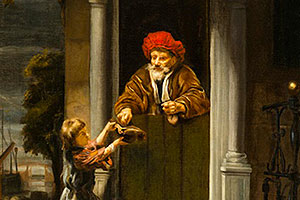
In the main obituary section of The Wall Street Journal, the editors remembered a Jewish industrialist who failed by modern metrics. His textile mill burned down. When he rebuilt it, he overextended himself and eventually lost control of his mill through bankruptcy proceedings in 2001.
Aaron Feuerstein, a former owner of Malden Mills in Lawrence, Mass., died on November 4 at the age of 95. Nothing in his story stands out from thousands of similar businessmen who never made it big. Even his misfortunes are nothing extraordinary.
Standing By His Employees
Nevertheless, Mr. Feuerstein won where it matters most. As a business leader, he captured the hearts of his employees and the imagination of Americans everywhere.
What made Aaron Feuerstein famous was not success but his attitude in the face of catastrophe. He became a model of how employers should treat their workers.
In December of 1995, a fire raged through the Malden Mills complex, destroying almost everything. He faced the decision of whether to rebuild. He also saw that the plant’s 1,400 workers were left destitute in the dead of winter. He could have collected the insurance proceeds and walked away from the disaster.
However, he decided to stand by his workers. He took a risk and retained all 1,400 employees on the full payroll for three months. He extended their health benefits and began rebuilding the plant so that they could return to work.
Help Remove Jesus Bath Mat on Amazon
In a 1997 speech, he explained that if the worker felt he was “treated the way he should be treated,” he would go the extra mile and make quality products for the company. He was right.
Overwhelming Response
The response to Mr. Feuerstein’s generosity was overwhelming. The workers could not believe their good fortune and effusively thanked him for what he was doing. News of the extraordinary gesture reached the media. An interview on “60 Minutes” turned the entrepreneur into an instant, unwilling national hero.
In these times of maximizing profits and obsessive self-interest, such heroic figures are not supposed to exist. A dog-eat-dog world does not reward such acts of kindness. However, stories like these attract Americans who yearn for times when people took care of others like family. As an indication of this thirst for goodness, Mr. Feuerstein received over 30,000 letters from admirers. He reflected that what he did should be the norm, not the exception. The fact that his case stood out was a sad reflection of the times.
The Need for Representative Characters
Unfortunately, Mr. Feuerstein’s story is rare. Few are willing to follow his golden example and sacrifice themselves for the good of others. Fewer are willing to risk their bottom line to keep others afloat.
Satanic Christ Porn-blasphemy at Walmart — Sign Petition
What is needed today are what sociologists call representative characters who act in society to promote the common good. In this particular case, Mr. Feuerstein stood by his workers in times of misfortune.
Indeed, representative characters perceive the ideals, principles and qualities desired and admired by a community or nation and translate them into concrete programs of life and culture. They go beyond self-interest and seek to represent the best of their communities or social groups. They know how to form those intense family-like bonds that unite people in shared sacrifice and fuse them to create a genuine society.
A society based on these robust reciprocal relationships is stronger than one that relies on government programs. Such links exude a warmth that contrasts with the cold hand of bureaucracy.
The Need for Christian Charity
However, there is more.
How Panera’s Socialist Bread Ruined Company
When imbued with Christian charity, which calls for the love of neighbor for the love of God, these figures can take this selfless spirit to unimaginable heights. The Church provides the natural and supernatural elements to help the faithful make those great sacrifices that so characterize the acts of the saints.
Thus, Christian civilization was a society full of representative characters that put into practice the principles of the Gospel. Found in all social levels, these souls communicated a sweetness to life in this vale of tears by their solicitude for others in society.
There is no reason why such representative characters should not exist today. Plenty of people have leadership qualities and succeed fabulously in what they do. However, what is missing is a culture that encourages the regeneration of the lost mutual bonds. Representative figures need to be encouraged to put their qualities to work to unify the nation and confront the present crisis.
The isolated case of Aaron Feuerstein even today stands out at his death, like a monument that no hate-filled Marxist BLM and Antifa mob can tear down.
What Does Saint Thomas Aquinas Say About Marriage?
Let America stop to honor his example and dream of a society dominated by such heroes who sacrifice themselves for the common good. Let Americans yearn for a world imbued with the Christian charity that will make such acts not the exception but the rule. God can make it happen.
As seen on The Imaginative Conservative.


